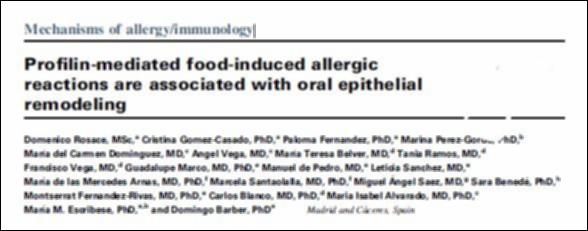Please use this identifier to cite or link to this item:
http://hdl.handle.net/10637/15430Profilin-mediated food-induced allergic reactions are associated with oral epithelial remodeling

See/Open:
Profilin_2019.JPG
37,03 kB
JPEG
See/Open:
Profilin_Rosace_et_al_JourAlle_ClinInmm_2019.pdf
Restricted Access
3,47 MB
Adobe PDF
Request a copy
| Title: | Profilin-mediated food-induced allergic reactions are associated with oral epithelial remodeling |
| Authors : | Rosace, Domenico Gómez Casado, Cristina Fernández Martínez, Paloma Pérez Gordo, Marina Domínguez, María del Carmen Vega, Ángel Belver, Teresa Ramos, Tania Vega, Francisco Marco, Guadalupe Pedro, Manuel de Sánchez, Leticia Arnas, Maria de las Mercedes Santaolalla, Marcela Sáez García, Miguel Ángel Benedé, Sara Fernández Rivas, Montserrat Blanco, Carlos Alvarado, María Isabel Escribese Alonso, María Marta Barber Hernández, Domingo |
| Keywords: | Allergy; Inflammation; Oral mucosa; Epithelial remodeling; Grass pollen; Profilin |
| Publisher: | Elsevier |
| Citation: | Domenico Rosace, Cristina Gomez-Casado, Paloma Fernandez, Marina Perez-Gordo, María del Carmen Dominguez, Angel Vega, María Teresa Belver, Tania Ramos, Francisco Vega, Guadalupe Marco, Manuel de Pedro, Leticia Sanchez, María de las Mercedes Arnas, Marcela Santaolalla, Miguel Ángel Saez, Sara Benedé, Montserrat Fernandez-Rivas, Carlos Blanco, Maria Isabel Alvarado, María M. Escribese, Domingo Barber, Profilin-mediated food-induced allergic reactions are associated with oral epithelial remodeling, Journal of Allergy and Clinical Immunology, Volume 143, Issue 2, 2019, Pages 681-690.e1, ISSN 0091-6749, https://doi.org/10.1016/j.jaci.2018.03.013. |
| Abstract: | Background: In areas of high exposure to grass pollen, allergic patients are frequently sensitized to profilin, and some experience severe profilin-mediated food-induced reactions. This specific population of patients is ideal to study the relationship between respiratory and food allergies. Objective: We sought to determine the role of oral mucosal epithelial barrier integrity in profilin-mediated allergic reactions. Methods: Thirty-eight patients with profilin allergy stratified into mild or severe according to their clinical history and response to a profilin challenge test and 6 nonallergic subjects were recruited. Oral mucosal biopsies were used for measurement of CD11c, CD3, CD4, tryptase, claudin-1, occludin, E-cadherin, and vascular endothelial growth factor A levels; Masson trichrome staining; and POSTN, IL33, TPSAB, TPSB, and CMA gene expression analysis by using quantitative RT-PCR. Blood samples were used for basophil activation tests. Results: Distinct features of the group with severe allergy included the following: (1) impaired epithelial integrity with reduced expression of claudin-1, occludin, and E-cadherin and decreased numbers of epithelial cells, which is indicative of acanthosis, higher collagen deposition, and angiogenesis; (2) inflammatory immune response in the mucosa, with an increased number of CD11c1 and CD41 infiltrates and increased expression of the cytokine genes POSTN and IL33; and (3) a 10-fold increased sensitivity of basophils to profilin. Conclusions: Patients with profilin allergy present with significant damage to the oral mucosal epithelial barrier, which might allow profilin penetration into the oral mucosa and induction of local inflammation. Additionally, severely allergic patients presented with increased sensitivity of effector cells. (J Allergy Clin Immunol 2019;143:681-90.) |
| URI: | http://hdl.handle.net/10637/15430 |
| Rights : | http://creativecommons.org/licenses/by-nc-nd/4.0/deed.es |
| ISSN: | 1097-6825 |
| Issue Date: | Feb-2019 |
| Center : | Universidad San Pablo-CEU |
| Appears in Collections: | Medicina |
Items in DSpace are protected by copyright, with all rights reserved, unless otherwise indicated.

